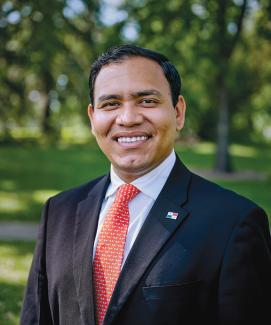Generations have often wondered what kind of world they might leave to their successors. Juan Carlos Monterrey Gomez (SLA ’14) didn’t wait to find out what type of world he would inherit — as vice chair for the Implementation of the United Nations Climate Change Convention, he has already forged a path to accelerate climate solutions globally.
Just a few years after graduating from Tulane, Monterrey Gomez was recognized by President Barack Obama as an inaugural scholar to the Obama Foundation. Since then, he led the youngest delegation (Panama) at COP26, the U.N. Climate Change Conference held last year in Glasgow, Scotland; founded the Climate Resilient think tank; and currently serves as executive director of the Geoversity School of Biocultural Leadership.































































